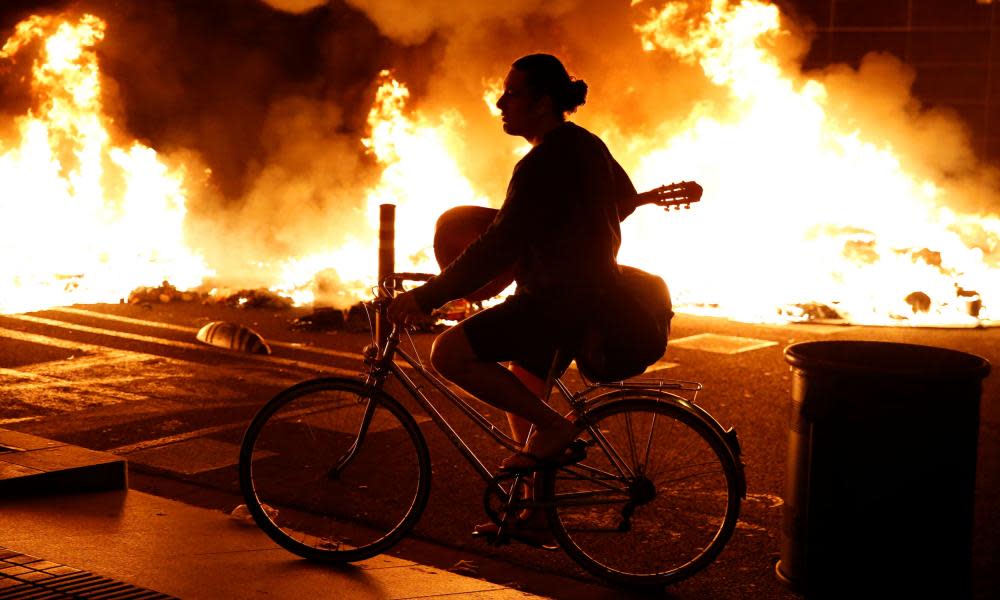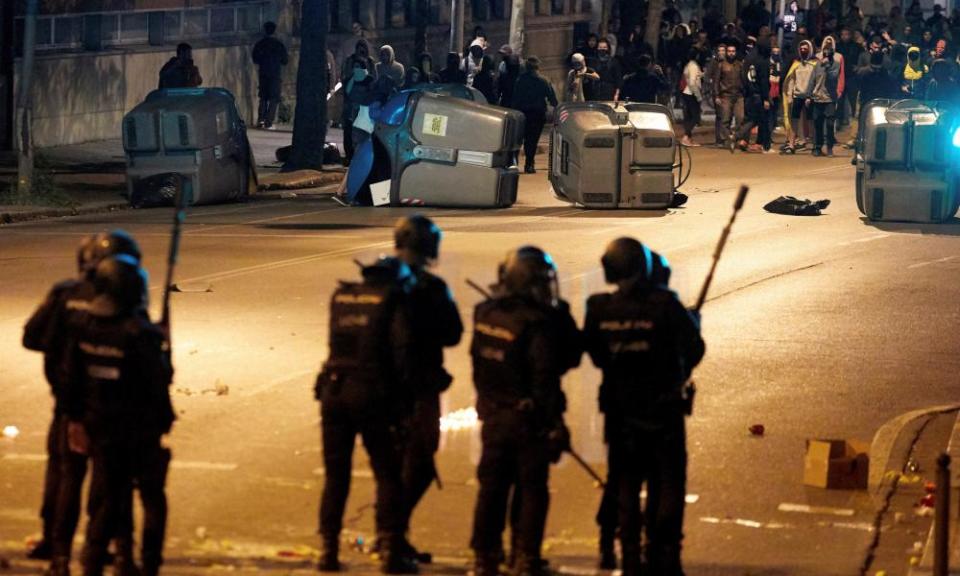Barcelona hit by more unrest over sentencing of Catalan separatists

Clashes between protesters and police erupted in Barcelona late on Tuesday after peaceful demonstrations over the jailing of nine Catalan separatist leaders descended into running battles.
Protesters lit fires and erected makeshift barricades in the centre of the city before the crowd was dispersed by baton charges by Spanish and Catalan police, as far as Passeig de Gràcia, the elegant boulevard that is home to many of the city’s most exclusive shops and hotels.
By mid-evening, dozens of fires had been lit on the boulevard and surrounding streets as helicopters hovered overhead. Makeshift barricades were set up with rubbish containers as skirmishes between demonstrators and police continued, with riot police firing numerous rounds of rubber bullets.
Similar scenes were witnessed in the other main Catalan cities of Tarragona, Girona and Lleida, where dozens of people were reportedly injured.

Earlier in the day, the grassroots organisation Assamblea Nacional Catalana (ANC) called for a candlelit protest outside the offices of the Spanish government in Barcelona and other Spanish cities in response to Monday’s sentencing of the nine Catalan politicians and activists for their part in the illegal referendum and unilateral declaration of independence in 2017.
The disturbances follow violence on Monday night when thousands of pro-independence protesters attempted to shut down Barcelona airport, leading to police charges that left more than 130 people injured.
Despite the long sentences handed down by the supreme court on 14 October, some of the nine leaders convicted of sedition and misuse of public funds could soon be eligible to apply for “semi-liberty”, allowing them out of prison on a regular basis.
Josep María Tamarit, a professor of criminal law at the Open University of Catalonia, said that in cases where a sentence of five years or more was handed out, a court could stipulate “that half the sentence has to be served before prisoners are eligible for semi-liberty”.
However, the supreme court turned down prosecutors’ request for such an order in the Catalan case.
That means that Jordi Sànchez and Jordi Cuixart – who have now served two years in pre-trial detention – could apply to be allowed out on licence as soon as they have served a quarter of their sentences, which would be in January next year.
Oriol Junqueras, who received the longest sentence – 13 years – would have to wait about 15 months before applying.
Those convicted can complain to Spain’s constitutional court and then put their case before the European court of human rights in Strasbourg.
The Spanish government has the power to issue pardons if they are requested and if the person convicted shows repentance for their crime. However, such a move would have profound political consequences.
Opponents of Spain’s acting prime minister, the socialist leader Pedro Sánchez, would accused him of bowing before the separatists were his government to even consider a pardon. Sam Jones
Although Tuesday’s demonstrations were called by the ANC, which has previously organised the independence movement’s peaceful and spectacular demonstrations, it appears that it has lost the initiative to the so-called Committees for the Defence of the Republic (CDRs) who favour direct action and confrontation.
The CDRs are thought to be behind the Tsunami Democràtic, the social network group that coordinated Monday’s airport protest.
The Catalan president, Quim Torra, has been criticised for calling for civil disobedience while also sending in Catalan riot police to restore order.
Torra said on Tuesday that the convicted prisoners were proud of the demonstrators and urged them to continue to mobilise over the coming days. A major demonstration and general strike has been called for Friday.

